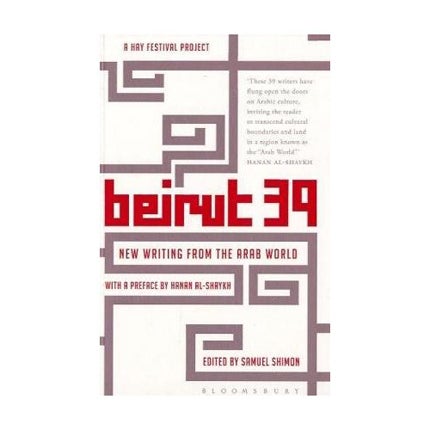Beirut 39: New Writing from the Arab World, Edited by Samuel Shimon
When the political gets personal

This wonderful, timely anthology, edited by Samuel Shimon and introduced by Hanan al-Shaykh, showcases the distinctive voices of 39 young Arab writers from around the world.
It ranges from Saudi Arabia to Morocco, from France to Syria, from Lebanon to Holland and the US, across mountains, deserts and cities, but always reveals the inner workings of the human heart and mind. Just as varied is the array of literary forms, taking in beautifully-translated short stories, poetry and novel extracts. Part of Beirut 39, a Hay Festival project to select and celebrate the best young Arab writers, this collection displays exciting linguistic experiment as writers capture complex experience in which the political intrudes upon the personal.
"There is no justice in this world," cries the character in Adania Shibli's compelling story. "At the Post Office," he adds. This theme courses throughout the collection as characters battle against the painful injustices of everyday life, from schools to politics to stifling family life, as children rebel against their parents. The theme of communication is at the heart of an ambitious and engaging collection. In Shibli's story, it is Afaf's duty to cross out the word "Palestine" on letters and replace it with the word "Israel". An urgent desire to communicate battles against forces, which attempt to silence the voice, as conjured in the moving "Co-existence" by Ala Hlehel.
The search for an identity is intelligently exhibited in Hala Kawtharani's raw, sensitive story, and explored elsewhere in the collection. "A poem is a naked person," wrote Bob Dylan, the epigraph to the haunting The Geology of the I by Joumana Haddad. It sensuously unravels the layers of personality to grapple with the core of who we are, also dealing with themes of the Arab woman and the challenges of self-expression. This quest for the true person is a motif throughout these vivid pieces, as identity is concealed behind layers of social construction.
"I am the books which I read as a child, which were unsuitable for me/(which I now write and which are still unsuitable for me)", writes Haddad. It is a gift to the world that these brave authors have written pieces, which both educate and entertain, shedding insight into lives lived beyond the news headlines, and blazing with the idealistic spirit and passion of youth.
Join our commenting forum
Join thought-provoking conversations, follow other Independent readers and see their replies
Comments
Bookmark popover
Removed from bookmarks